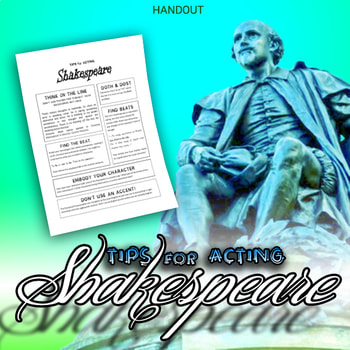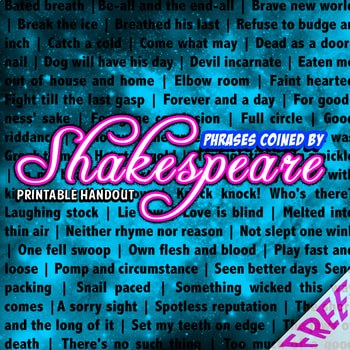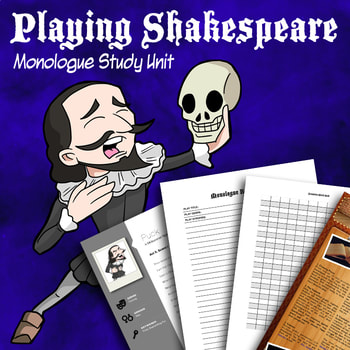|
Originally posted to blogspot on July 9, 2017 When I first started teaching theater, as I excitedly told my friends and coworkers what I was planning to do for my fall production, I was met with doubt. Romeo & Juliet? Why would anyone want to direct Shakespeare? Why would anyone want to direct Shakespeare with teenagers? My decision was threefold.
But as I was met with incredulous looks, scoffs, and questions, I started to wonder why everyone else was so afraid of Shakespeare? Some of the ninth grade English teachers were excited to have another way in for their students, but others just couldn't see the appeal for kids. All Greek to MeShakespeare is practically in another language. It's written in Early Modern English, which is the furthest back we can go and still understand our own language. To someone who has never read it, it can be very difficult to understand. But if you add inflection and action, the meaning becomes much clearer, and the more of it you read and work with, the more you understand it. To put it in gamer terms, you level-up your linguistics skill. Why would a teacher not want that for her students? From the first read-through (pictured above) the kids were already engaged, making jokes about their characters and bonding over who was playing family to whom. We performed a cut that kept the show under two hours, removed some of the rape jokes (Act I, Scene i), and condensed Mercutio's less-accessible puns. We had six boys, so Benvolio and Mercutio were played by girls and all of their pronouns were changed. The first read-through was followed by two weeks of table reads. We worked with Shakespeare dictionaries and talked through scenes to make sure everyone knew exactly what they were saying. We talked about what plot points were essential to communicate in the scene to make sure our audience understood the story. Through rehearsing the show, students got a much deeper understanding of the text than they could have in the limited ELA classroom hours, and by the end of the process, Romeo was fluent enough in Shakespeare to come up to me with requests to add lines back into his scenes. After talking to my colleagues in the English department, I found that my drama club students were becoming some of the most eager participants in reading Shakespeare in their classes. In my theater classes as we read A Midsummer Night's Dream, I could rely on them for participation and insight. What did these kids get out of this experience, aside from fluency in a dead language? Romeo & Juliet itself was a great show to discuss love, passion, hate, violence, and suicide. In our table reads we discussed Lord Capulet's abusive nature. We discussed the psychology of the two teenagers at the center of the story. Partway through the rehearsal process I lost an actor friend to violence-- someone who was in the wrong place at the wrong time-- and got to hold a frank discussion with these kids about the permanence of death and how easy it is for a punch to turn into murder. 9 oz. of (Fake) BloodWhen we finally got on our feet, the real fun began. Students came into school on a holiday for three fight choreography sessions: Act I, Act III, and Act IV. There's a beautiful purity to the acting of fight scenes. It's all about objective, and the body has to tell the story. Our actors had to learn how to carry themselves with intent, and our Romeo had to learn to stop smiling as he cut Tybalt's throat. For our student athletes, stage violence was the perfect way in to movement studies. (See right, Romeo and Paris rehearse their fight scene.) Everything was done with SAFETY FIRST in our minds. By the end of the four night run, we had used over 9oz of fake blood in blood packs. And the kids had fun! When we dismiss Shakespeare as old and dead, we throw away a body of literature with timeless themes. We throw away access to centuries of literary allusions. We throw away understanding of paintings and songs and novels. We throw away a man who invented a significant portion of the words and phrases that we use today! Let's commit right now to challenge our kids instead of underestimating them. Let's not rob them of intellectual growth by saying they can't do it. Remember the mantra of a growth mindset, "Not Yet," and then figure out how to get them there. Shop Shakespeare on teachers Pay Teachers
0 Comments
Your comment will be posted after it is approved.
Leave a Reply. |
AuthorAmy is a drama teacher with an M.Ed. in Secondary Education, ELA, teaching in the suburbs of Birmingham, AL. Archives
December 2020
Categories
All
|






 RSS Feed
RSS Feed
